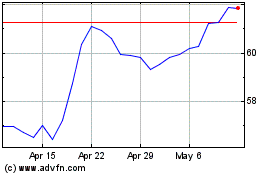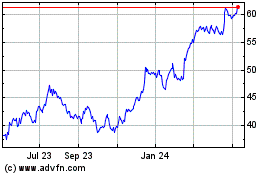Wells Fargo Sweetens Broker Recruitment Bonuses--Update
May 25 2017 - 2:56PM
Dow Jones News
By Michael Wursthorn
Wells Fargo & Co. is sweetening its signing bonuses for
veteran brokers, a move to capitalize on Morgan Stanley's and
Merrill Lynch's retreat from the industry's costly recruiting
practice known as "prisoner exchange."
The San Francisco bank's brokerage arm told industry recruiters
earlier this week it would raise its recruitment offers after The
Wall Street Journal reported Morgan Stanley would significantly cut
back on the pricey practice of poaching brokers, people familiar
with the matter said.
"Attracting the industry's top talent will always be a priority
for Wells Fargo Advisors," a spokeswoman for Wells Fargo said,
adding that recruiting advisers and gaining their clients has
"helped us grow in key markets."
Wells Fargo is betting on a vacuum left in the wake of its
rivals' recent decisions to tamp down their recruitment efforts,
industry recruiters told the Journal, as the brokerage unit
grapples with an exodus of brokers in the wake of its retail
banking scandal.
Wells Fargo's brokerage arm, known as Wells Fargo Advisors, has
been losing brokers at a higher rate since the bank paid a $185
million settlement in September for opening up as many as 2.1
million accounts using fictitious or unauthorized information. At
the end of September, Wells Fargo had 15,086 brokers, but its head
count fell nearly 3%, or by 429 brokers, through the first quarter
of this year.
Over that same period, both Merrill Lynch and Morgan Stanley's
head counts declined by half a percentage point, while UBS lost
slightly more, with its total number of brokers falling by about
1.7%.
For brokerage firms, recruiting is synonymous with growth.
Brokers hired away from rivals usually bring as much as 80% of
their clients and assets with them, giving the acquiring firm an
immediate revenue boost. "Recruiting is instant magic," said Bill
Willis, a Los Angeles-based brokerage recruiter.
Before last fall, deals had reached such lofty prices that they
were sometimes money-losers for firms, paying the industry's most
sought-after brokers more than three times the fees and commissions
they generated in the past year. However, in October, the Labor
Department said certain incentives tied to those bonuses could run
afoul of its fiduciary rule requiring brokers to act in the best
interest of retirement savers, forcing brokerages to lower the
overall size of its deals.
For brokers who generate several millions of dollars in fees and
commissions, Wells Fargo is willing to offer a recruitment bonus of
as much as three times the annual revenue they generate, with the
bonus structured as a loan forgiven as the broker stays with the
firm and hits certain targets, people familiar with the matter
said. That is up from the roughly 2 1/2 times most brokerages were
recently offering, but still below the sky-high deals offered in
the years following the financial crisis.
Executives often called recruiting a "zero-sum game" as
brokerages would spend millions of dollars swapping brokers with
one another, sometimes referring to it as a "prisoner exchange."
Still, brokerages weren't willing to pull back out of fear a rival
would attract big-money teams, recruiters and analysts say.
That was until UBS last year changed its recruiting practices to
extend offers only to teams of brokers managing hundreds of
millions of dollars, if not billions. Merrill followed suit earlier
this month, telling some executives they would pause all recruiting
after June 1 as it worked on a new incentive packaged aimed to the
industry's biggest producers. Then Morgan Stanley followed with its
own decision this week.
UBS, Merrill and Morgan Stanley are all looking to cut back on
their spending at a time when firms are spending tens of millions
of dollars to comply with the Labor Department's fiduciary rule.
Each of them have said they plan to redeploy money saved from
recruiting into supporting their existing brokers, encouraging them
to collect more assets and revenue.
Wells Fargo, however, has been in a different predicament since
a less-than-successful 2015 recruiting deal with Credit Suisse
Group AG, recruiters say. The firm had struck a deal at the time to
recruit as many as 250 financial advisers from Credit Suisse's U.S.
private bank in an effort to strengthen its standing with
ultrawealthy clients.
But scores of brokers went on to pass on Wells Fargo's offer to
join rival firms, with many choosing UBS. The number of moves
caught Credit Suisse's attention and the Swiss bank filed an
arbitration claim with Wall Street's self-regulator, the Financial
Industry Regulatory Authority, later that year alleging UBS
unfairly raided its U.S. private-banking business.
Wells Fargo ended up recruiting about half of those Credit
Suisse brokers by mid-2016, while UBS, which didn't have any formal
arrangement with Credit Suisse, added around 100, people familiar
with the arrangement said at the time.
"If Wells Fargo continues now, it has a great opportunity," said
Michael King, a brokerage recruiter in New York, noting that Wells
Fargo is intent on using their rivals' retreat from recruiting to
bolster their presence among wealthy clients.
Write to Michael Wursthorn at Michael.Wursthorn@wsj.com
(END) Dow Jones Newswires
May 25, 2017 14:41 ET (18:41 GMT)
Copyright (c) 2017 Dow Jones & Company, Inc.
Wells Fargo (NYSE:WFC)
Historical Stock Chart
From Mar 2024 to Apr 2024

Wells Fargo (NYSE:WFC)
Historical Stock Chart
From Apr 2023 to Apr 2024
